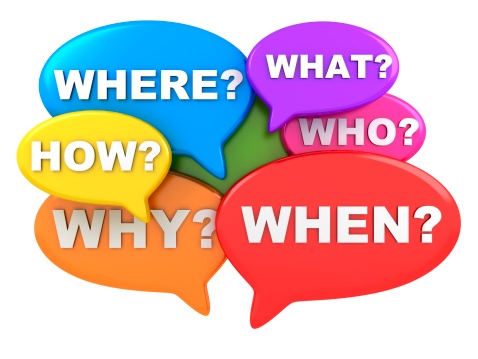 Often times, understanding and answering who, what, when, where, and why questions are targeted in speech therapy. By increasing children’s abilities to answer wh-questions, they are then better able to tell you what happened during their day, who they played with, and even where they hid your favorite shoes. Here are a few ideas on how to practice wh-questions in the home, grocery store, restaurant or anywhere your day takes you:
Often times, understanding and answering who, what, when, where, and why questions are targeted in speech therapy. By increasing children’s abilities to answer wh-questions, they are then better able to tell you what happened during their day, who they played with, and even where they hid your favorite shoes. Here are a few ideas on how to practice wh-questions in the home, grocery store, restaurant or anywhere your day takes you:
Who?: This question typically involves increasing your child’s vocabulary and is developed around age 2-3 years old. This can be done by pointing out different occupations around the community, while reading books, or while watching TV. For example, if you see a police officer, you can point out the police officer to your child and say “Look there is a police officer, he helps keep us safe”. Then you can later ask your child “who keeps us safe?” and he/she will better be able to recall the connection about a police officer keeping us safe.
What?: ‘What’ questions typically develop around age 1-2 years old with your child answering questions about familiar objects or items. This question can be asked throughout your child’s day in a variety of different ways. Not only can you ask what an object is, you can also ask what color is it, what shape is it, or what do you do with it? During meal times, you can also ask a child “what do you want to eat?”
When?: Children are typically able to answer ‘when’ questions around age 4 years old. You can introduce ‘when’ questions by relating it to a time. You can do this by talking about a major upcoming event or holiday and relating it to something that happens during that time. For example, during Halloween you can talk about going trick-or-treating. Then ask your child “when do we go trick-or-treating?” You can also incorporate this question into your daily routine by letting your child know “when we get home, we can color” and then asking them “when are we going to color”
 Where?: Around age 1-2 years old, children begin answering ‘where’ questions by pointing to places or pictures in books. By age 3 years old, they should be able to answer ‘where’ questions using more than pointing or gesturing. To facilitate this, playing hide-n-seek with objects can be a fun game to play. Take turns hiding an object in places such as behind the couch, on your head, or under the bed and then asking them where the object is. This is also a great way to introduce your child to early prepositions!
Where?: Around age 1-2 years old, children begin answering ‘where’ questions by pointing to places or pictures in books. By age 3 years old, they should be able to answer ‘where’ questions using more than pointing or gesturing. To facilitate this, playing hide-n-seek with objects can be a fun game to play. Take turns hiding an object in places such as behind the couch, on your head, or under the bed and then asking them where the object is. This is also a great way to introduce your child to early prepositions!
Why?: This type of question is typically understood around age 3-4 years old. As a parent or caregiver, we are often encouraging our children to participate in activities that are not motivating to them such as taking a bath, brushing their teeth, or eating their vegetables. A great way to work on ‘why’ questions is to relate these frustrating tasks to a reason. For example, explain to your child we need to take a bath because we are dirty. Then the next time your child does not want to take a bath, you can ask them “why do we need to take a bath?”
Helpful hint: Some children need a little help in this area. If your child is having a hard time answering the question the first time it is asked, give them two choices. For example, if you ask “when do you go to bed?” you can then follow up with “at night or in the morning?” This will help your child understand the type of question you are asking.
Katie Egea, MS, CCC-SLP


